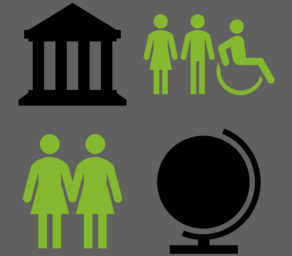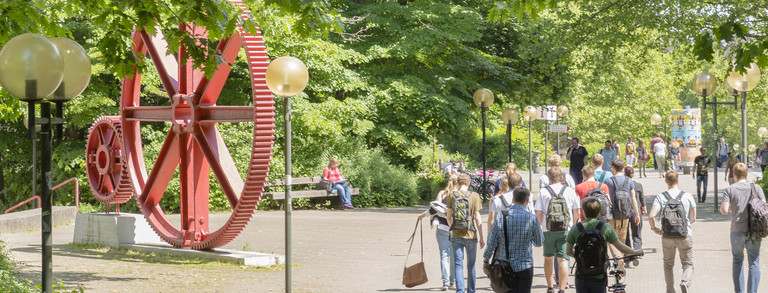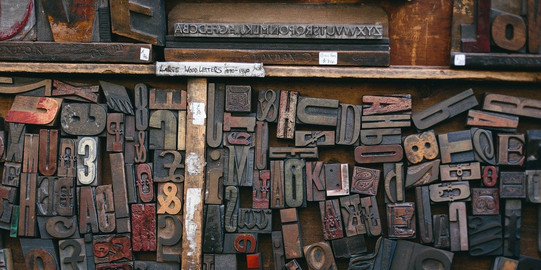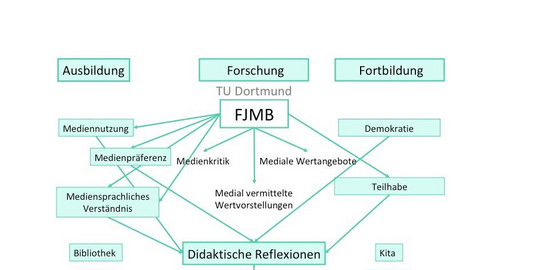Research Profile
The Institute for Diversity Studies. Cognition ∩ Literature ∩ Media ∩ Language at TU Dortmund University explores diversity from a linguistic, literary and media studies perspective. The mathematical symbol for intersection ∩ underlines the interdisciplinary research approach and at the same time indicates the overlapping of different aspects of identity. These include, in particular, age, gender, first and second language, ethnic and social origin, etc. Competences and potentials, but also forms of disadvantage and discrimination, can be linked to these aspects.
The members of the Institute research diversity from a cultural studies perspective and reflect critically on the respective methods. One focus is on the description of factors that create diversity, for example in the area of language acquisition, language use and language processing, especially under the conditions of migration-induced multilingualism. Another focus is the socio-cultural effects of diversity from the point of view of heterogeneity / homogeneity, exclusion / inclusion, participation, disparity, mobility and intersectionality.
The concept of Diversity Studies as it is used in Literary and Media Studies is based on the approaches developed in Minority Studies as well as in Postcolonial, Gender, Queer, and Disability Studies since the 1990s. The focus of these studies has always been on the constitutive significance of language for the individual in modern times and their participation in constructive processes of understanding, the generation of knowledge and socio-political recognition. Every single approach to the analysis of modern sociocultural identity discourses that wanted to do justice to the aspects of hybridization, differentiation and aestheticization increasingly takes into account that identity and the questions of possible participation are always dependent on various interdependent factors. The discussion of the classic triad of gender, race, and class gave this differentiation an important impetus for more recent research.
Based on newer concepts of interdisciplinary gender and diversity studies, we primarily look at the interfaces between linguistic, cultural and social diversity. In German and English teacher training courses, we dedicate ourselves to an inclusive and diversity-sensitive teaching to provide much needed necessary pedagogical competences for increasingly heterogeneous classrooms. At the center of our attention are social inequalities and cultural differences as well as the positive side of diversity. We value interdisciplinary research in an international context, which we closely interlink with our range of courses. In this way, we integrate innovative and proven formats of academic teaching into German Diversity Studies in order to also contribute linguistic and cultural studies approaches to the overall societal transformation processes in the direction of diversity, diversity and inclusion.
The researchers of the Institute for Diversity Studies research and teach mainly on the following issues:
-
How is diversity communicated in a society?
-
Which languages are learned and used for this?
-
Which narratives about diversity are currently being collectively negotiated and which values are conveyed through them?
-
Which media transformations do these narratives experience and how are they perceived and passed on?
Projects and Laboratories
Was bedeutet eigentlich Diversität?
→ What does diversity actually mean?
Diversity stems from the Latin term diversitas, which means 'difference' or 'variety'. The term was initially only used in the field of Biology ('biodiversity') before it was adopted by Sociology and Cultural Studies in the 1960s. Diversity research primarily examines the origins and effects of social inequalities as we know them today in Western societies and which were predominantly defined by the sciences in the course of the 18th and 19th centuries. These include, for example, binary notions of gender identities or concepts of race and hegemonic colonial politics. Language, literature, and media have made a decisive contribution to these developments, not least in cognitive, epistemic, aesthetic and symbolic terms. For some years now, diversity has been reinterpreted more and more often in positive terms and used in economic, scientific and cultural contexts to emphasize diversity as a potential for more acceptance and mutual respect for cultural difference within society.









